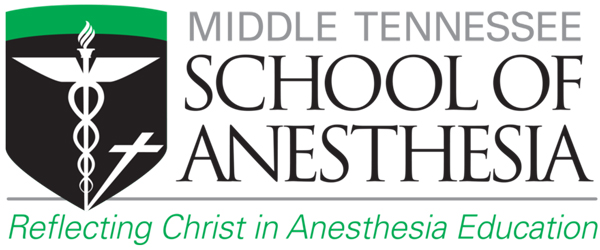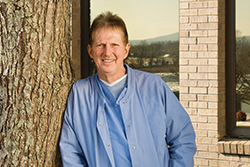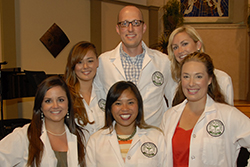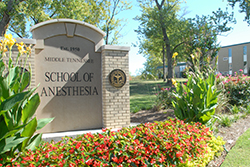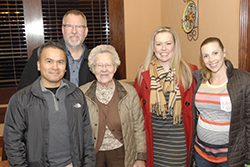Airways
January – March 2017
Perry awarded prestigious President’s Medal
MTSA President’s Medal recipient MaryAnn Perry (center) following the presentation by President Chris Hulin (right) and Dr. Perry’s doctoral committee chairperson Dr. Amy Gideon, MTSA Director of Institutional Effectiveness & Learning Resources (left).
Middle Tennessee School of Anesthesia Doctor of Nurse Anesthesia Practice Graduate MaryAnn Perry, DNAP, CRNA, was named the recipient of the MTSA 2016 President’s Medal at the commencement exercises on Nov. 18, 2016.
The President’s Medal is presented to an outstanding DNAP graduate recognizing their scholarly project that may advance the current practice of nurse anesthesia. Doctoral projects are considered using the following criteria:
- Significance of the work to nurse anesthesia practice
- Impact on patient care and safety
- Contribution to the current body of knowledge
- Improvement in a process of healthcare delivery systems
- Mastery of a subject defining expertise in a given area
During the award presentation, MTSA President Chris Hulin, DNP, MBA, CRNA, recognized Dr. Perry for her concern about healthcare professionals’ use of technology, saying, “She has remained dedicated to this pursuit throughout her time at MTSA, and her enthusiasm for this topic fueled her hard work. We know that MaryAnn will continue to be a champion for improving patient safety through increased technology awareness and training.”
When her name was announced, Perry said she was taken by surprise: “I can’t even begin to convey how shocked I was! I wasn’t expecting it at all. It means so much to me that I was considered for the award and that the faculty and administration thought highly of my project.”
Perry added that her support network was critical to the process, saying, “My advisor, Dr. Amy Gideon, gave me 200% support. And Dr. John Shields and Dr. Michael Vollman were instrumental in guiding me and keeping me on target. They were all very supportive.
“I’m very passionate about proper training in anesthesia-related technology. I think completing my DNAP project can help me move forward in terms of implementing changes wherever I’m working so that patient safety can be improved,” she said.
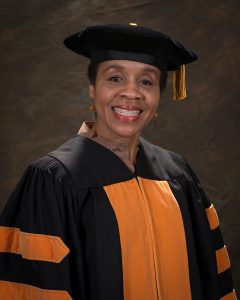
MaryAnn Perry, DNAP, CRNA
Hometown: New Orleans
Perry received her Bachelor of Science in Biology/Chemistry from Jackson State University, her BSN from the University of Mississippi, and her Master of Science in Nurse Anesthesia from Xavier University.
Perry has worked as a CRNA for more than 20 years in a wide variety of clinical settings throughout the United States. In her application essay, she stated her concern about healthcare professionals “handling the exponential increase in knowledge needed in information technology used in a complex healthcare delivery system.”
Following are excerpts from an extended conversation with MaryAnn Perry regarding her experience at MTSA.
Airways: What was the reaction from your family and friends at winning the award, and what kind of support did you receive from them throughout your time at MTSA?
MaryAnn Perry: My family was always there throughout the process and very supportive of me. They would call me on the phone to ask how the program was going, and I would have to tell them, ‘I’ve got 10 minutes, then I have to get back to my work!’ They were there at graduation and cheered me on. They were so happy that I received the President’s Medal.
Airways: What’s been your work experience as a nurse anesthetist, and how did you get you where you are now?
M.A.P.: I’ve been working as a CRNA for 20 years. I started as a staff CRNA in New Orleans, but I eventually wanted a new challenge. So I embarked upon becoming an independent contractor, and for the last 12 years I’ve been traveling around the country working with different anesthesia services. Right now I’m with Northstar Anesthesia in Louisville, Ky. I really enjoy it. I get to meet new people, do new things, and use new technology. That’s what led me to this topic for my project—the fact that I was traveling and had come in contact with new technology that required a lot of training.
Airways: What made you choose MTSA, and now that you’ve completed your degree, what does your experience at the School mean to you?
M.A.P.: Reading their mission statement really propelled me to become interested in them. The more I read about their history, vision and what the DNAP program entailed, I became interested in pursuing my degree there. They were right on target with my expectations of the program. I also liked that it was a “DNAP”—anesthesia specific.
I remember after my first day of the program, doing the intensive session, we were bombarded with a lot of projects. When I went home that night, I contemplated not going back the next day! But then it dawned on me that this was what I wanted to do. It’s challenging. You have to take the initiative, and it was stressful at times. But it’s definitely worth it.
Airways: Were there any particular moments that left a lasting impression?
M.A.P.: In the process of completing my project, I was at a standstill. I called Dr. Gideon and told her I wasn’t sure how to keep moving forward with the project. She gathered the other committee members, we met, and after that meeting, I knew I was headed in the right direction. They put me on the right track. They steered and motivated me.
Airways: What do you think makes MTSA unique?
M.A.P.: Certainly the DNAP program because it’s for nurse anesthetists. Everyone is so personable, yet professional. They always treat you with respect. If you need something or don’t understand something, they’re always available via email, phone call, WebEx or text. They also practice what they preach, when it comes to their mission statement. MTSA endeavors to be a national leader in academic and professional excellence, specific to nurse anesthesia education. You see it every day in the way they interact with and care for students.
Airways: What does it mean to you to be a CRNA and how you serve patients?
M.A.P.: It’s important to me to do an exceptionally good job with my patients. Once I started at MTSA, things I had learned a long time ago as a nurse anesthetist came back to me. First and foremost is being a patient advocate and focusing on safety.
President’s Message
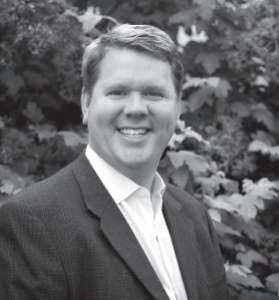
Chris Hulin
DNP, MBA, CRNA
President
Happy New Year!
As we bid farewell to 2016, I’d like to take a moment to recognize and thank those who have truly embodied our mission to reflect Christ in anesthesia education.
Mid-year I issued a “service challenge” by encouraging our faculty and staff to give back a portion of their time on work that would help our community—either locally or globally. Knowing that MTSA is blessed with so many servant-leaders, I was confident our team would find numerous ways to make this effort successful. And of course, my expectations were blown away!
Carol Stinson, Coordinator of Academic Support, took it upon herself to help a homeless man named Kimmie White, a disabled veteran. She spent hours taking him to medical appointments, helping him move into housing, and inviting him to church. She even provided financial help for motel rent and car repairs! Thanks in part to Carol’s efforts, Kimmie is now back on his feet and planning on moving to Oklahoma to reconnect with his family.
Pam Nimmo, Admissions/Recruitment Coordinator, facilitated our participation as a PENCIL Partner with Maplewood High School’s Academy of Sports Medicine and Wellness. As part of the program, MTSA students and staff volunteered to help students with EKG training, learning how to take blood pressure, and other health-related skills, as well as tutoring and mock interviews. The team is looking forward to future volunteer opportunities that include speaking to history classes about the development of anesthesia and to math classes regarding how math is used in nursing.
In total, 11 employees gave nearly 275 hours to a variety of service work and charitable organizations as part of the service challenge, including:
- 403 Center
- Cat & Kitten Rescue
- Cedar Hill Bike Criterium
- Distinguished Young Women Scholarship Program
- Dominican Republic Mission Trip
- Habitat for Humanity
- Haiti Mission Trip
- Long Hollow Baptist Church
- Project Connect Nashville
By now you’ve heard about the mission trip we took to Haiti in October, which you can read about here. It was an honor to be part of the team that brought our educational expertise to nurses as well as much-needed medical services to patients.
As I’m sure you’ll agree, MTSA reached milestones in 2016 that are worth celebrating. And yet our aspirations for 2017 beckon us to look ahead. We anticipate more lives touched because of our desire to share our blessings of time and resources.
Let’s make this another banner year of service. Consider joining us by participating in the Mission & Awards Gala in May or Golf Classic in September, or by volunteering in your local community as a representative of the nurse anesthesia profession.
Thanks again for being an important part of MTSA’s efforts to reflect Christ in anesthesia education!
How CRNA technology training affects patient safety
A review of DNAP graduate MaryAnn Perry’s scholarly project

MaryAnn Perry
DNAP, CRNA
Proper training when using anesthesia-related technology is a topic that is near and dear to MaryAnn Perry, a 2016 graduate of MTSA’s DNAP program. In her role as a certified registered nurse anesthetist (CRNA) who travels to myriad clinical sites as an independent contractor, she has direct experience with learning new technology on a regular basis.
That’s why she decided to tackle the subject in her scholarly project: Factors Impacting Anesthesia-Related Technology Training: A Pilot Study.
“As an independent contractor going to different facilities, I came in contact with technology that I may have used months ago, or that may be completely new. So the question is, ‘How can CRNAs get the best training possible to ensure patient safety?’ It’s a major problem that continues to affect our profession,” Perry said.
She pointed out that anesthesia providers perform a vast proportion of their work in the complex environment of an operating room. They are the principle users of medical devices in clinical practice, and they are dependent on highly technical and complex monitoring devices and equipment.
Perry’s project revealed that:
- There is still a low rate of anesthesia professional participation in training programs associated with the introduction of new or existing technology into clinical practice because of insufficient time and inadequate staff.
- Conventional in-service programs that introduce new equipment are often recognized as superficial and inadequate because they are not mandated and do not allow individual practice, among other factors.
- Although the incidence of equipment-related critical events is relatively low, morbidity associated with such events can be quite high.
- Human error is the leading contributor to equipment-related problems, and is typically magnitudes greater than pure equipment failure, which itself is rare.
According to data collected from her CRNA survey, 50% of respondents indicated that mandatory in-service training was not required on new or existing anesthesia-related technology.
“This is a big issue because of patient safety. CRNAs should be knowledgeable about the technology and should know how to use it,” Perry said. “If you don’t have the proper training, you’re setting yourself up for a barrage of patient safety issues.”
She contends that anesthesia is generally very safe, but poor patient outcomes still occur because of device failures and user errors. “Despite advances in technology, patient safety can be increased only by combining the use of modern technology with improvements in education, training, and standards of clinical practice,” she said.
She concluded that conventional in-service needs to be replaced by more advanced and effective training in order to achieve reliable benefits from anesthesia-related technology.
“As a result of this project, I hope we’ll see a change in how nurse anesthetists receive training on new technology. New anesthesia-related technology poses safety problems if users are not trained properly. Introducing new technology without adequate training/education, and an adequate analysis of how anesthesia staff will interact, creates an environment of patient safety issues. Productivity demands are forcing clinical staff to work faster, and when such directives are coupled with new devices and equipment, even the most competent staff may not be able to perform their work safely. This is an area that has to change if we’re going to realize the goal of the Anesthesia Patient Safety Foundation that ‘no patient will be harmed during anesthesia,’” Perry said.
2016 Commencement exercises held
Degrees conferred on MS, DNAP graduates
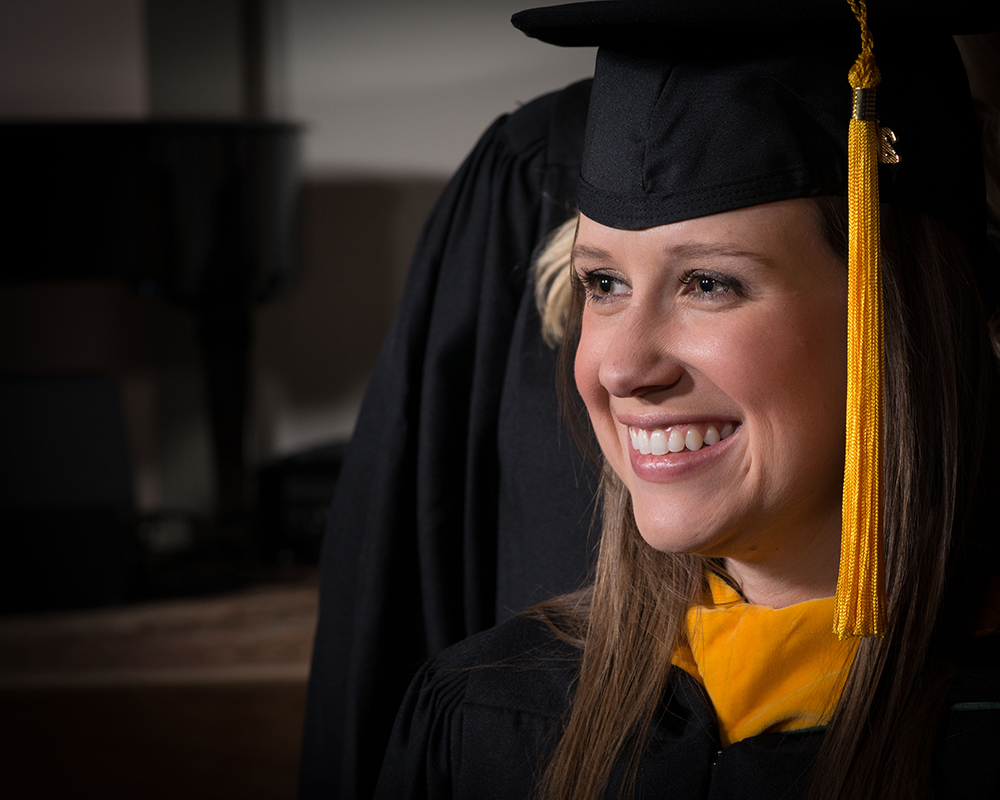
MTSA Class of 2016 Master of Science with Focus in Anesthesia graduate Ellie Briscoe celebrates her achievement
Commencement exercises for the Middle Tennessee School of Anesthesia Class of 2016 were held Friday, Nov. 18, 2016, at the Madison Campus Seventh-day Adventist Church (MCC) and streamed live on YouTube.
Mary Elizabeth “Ikey” DeVasher (’69/’94) PhD, CRNA, Dean Emerita, led the procession of MTSA board of trustees, administration, faculty, and graduates while carrying the MTSA mace. President Chris Hulin welcomed the attendees and was followed by the invocation by Class of 2016 graduate Josh Payne.
MTSA Chairman Art Runyon-Hass, MD, gave opening remarks followed by graduate Crystal Koss, who introduced the other speakers. Ken Whetmore, Senior Pastor, MCC, presented a homily and spiritual challenge to the class. The commencement address was presented by Bruce Schoneboom, PhD, CRNA, FAAN, COL (Ret), USA, Director for Education and Professional Development for the American Association of Nurse Anesthetists, which was followed by remarks from MTSA Program Administrator Rachel Brown, DNP, CRNA.
Dr. Hulin handed diplomas to graduates of both the Masters and Doctor of Nurse Anesthesia Practice degrees, after which he presented this year’s graduate awards. The ceremony was closed with a benediction by graduate Pauline Bailey.
Class of 2016 Clinical Experience
Each year MTSA graduates well-exceed requirements of the National Board of Certification and Recertification for Nurse Anesthetists (NBCRNA) regarding the number of cases and procedures for clinical experiences in order for the candidate to be eligible to take the National Certification Examination.
NBCRNA sets the required numbers of cases and procedures for clinical experiences in order for the candidate to be eligible to take the National Certification Examination.
The following statistics are derived from the information provided to the NBCRNA for certification requirements for the graduates as of Nov. 7, 2016. NBCRNA requires a minimum number of 550 cases. The average number of cases performed by members of the class of 2016 was 955 cases. The graduate with the highest number of cases performed was Jamie Gill who had 1,221 cases.
NBCRNA requires a minimum of 850 hours of clinical time. The average number of hours spent actually doing anesthesia by the members of the class of 2016 was 1,726 hours. The graduate with the most hours of anesthesia time was Jason Mancini with 2,607 hours.
NBCRNA requires each graduate to have administered anesthesia to at least 35 pediatric patients. Members of the class of 2016 performed an average of 187 anesthetics for pediatric patients. The graduate with the highest number was Jake Carroll with 303 pediatric cases.
NBCRNA requires each graduate to have provided anesthesia for at least 30 obstetrical patients. The average number of anesthetics in this category for members of the class of 2016 was 100. The graduate with the highest number was Sarah Drewery with 168 obstetrical patients.
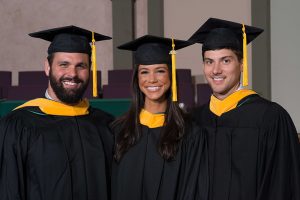
Since 2000, graduates from all programs across the United States are required to perform a minimum of at least 25 regional anesthetics. These 25 can be from a combination of all categories of regional anesthesia. The members of this graduating class administered an average of 133 regional anesthetics. Epidural and spinal anesthesia are techniques of regional anesthesia. The members of this class performed an average of 32 spinal anesthetics, and the graduate performing the highest number was Jason Mancini who performed 212 spinals. The members of this class performed an average of 66 epidurals. The graduate performing the highest number was Clint Peterman who placed 124 epidurals.
GRADUATE AWARDS
During the graduation ceremony, awards were presented to the following graduates:
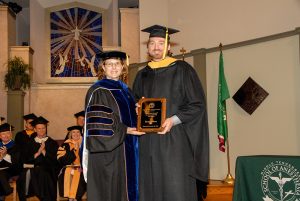
Team Spirit Award: Ryan Abbott
This award is voted on solely by Masters students and given to the person in their class who has continually offered encouragement and was always willing to lend a helpful hand.
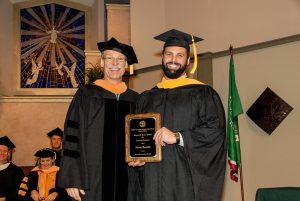
Bernard Bowen Award for Academic Excellence: Kevin Buntin
This award is named for the founder and first Program Director of the school of nurse anesthesia in 1950. The recipient was chosen by votes from the MTSA faculty and Administration. The student selected for this award must have upheld the mission and core values of MTSA, achieved a GPA of 3.75 or higher, exhibited professionalism during interaction with classmates and academic faculty, and fostered a spirit of academic excellence beyond the expectations and degree requirements.
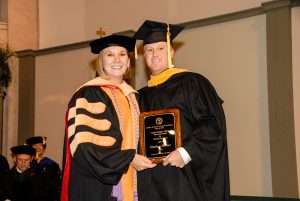
Agatha Hodgins Award for Clinical Excellence: Matthew Stewart
This award is named for the founder and first president of the American Association of Nurse Anesthetists. Ms. Hodgins was also a strong advocate for the education of nurse anesthetists. The clinical affiliates of Vanderbilt, General Hospital, along with MTSA Administration, had input into the selection of the recipient for this award. The student selected for this award must have upheld the mission and core values of MTSA, achieved a GPA of 3.75 or higher, and exhibited professionalism during interaction with clinical faculty and classmates, and fostered a spirit of clinical excellence beyond the expectations and degree requirements.
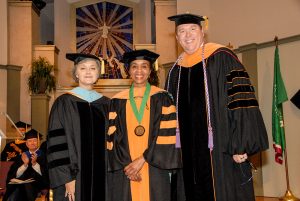
President’s Medal: MaryAnn Perry
This is an award voted on by the doctoral faculty for the candidate whose doctoral work advances or has the potential to impact the current practice of nurse anesthetists locally, nationally, or even globally. See special feature on Perry’s award and project here.
Haiti mission trip brings hope, changes lives
MTSA team provided anesthesia in 20+ advanced cases, led educational sessions with nurses
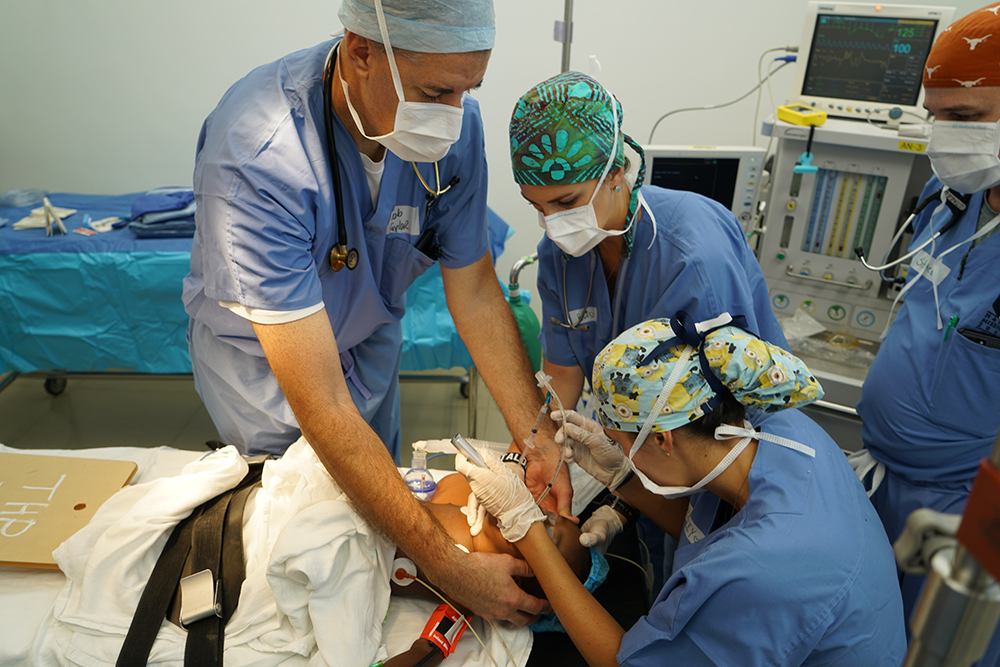
MTSA Haiti mission team members provide anesthesia in the Hopital Adventiste d’Haiti in Carrefour.
After months of planning, Middle Tennessee School of Anesthesia students and staff finally ventured to Haiti for a mission trip that so many had supported financially as well as through prayer. From the perspective of everyone involved—on both the receiving and giving ends of the team’s service—the trip was a resounding success.
“It was very rewarding to be part of an effort that not only focused on providing medical care for individuals but, more importantly, imparting knowledge to the caregivers that will stay with them for a lifetime,” said Chris Hulin, DNP, MBA, CRNA, President of MTSA. “Our goal was to leave a long-lasting mark by elevating the providers’ level of care. It’s the educational component that will really make a difference in the local people’s lives for years to come.”
The MTSA team arrived in Haiti on Oct. 23, 2016, for its weeklong mission providing Acute Surgical Pain Management (ASPM) care alongside surgeons from the Touching Hands Project. Their home base was Hopital Adventiste d’Haiti in Carrefour, a few miles outside the capital city of Port-au-Prince. The group also held continuing education sessions for local doctors and nurses and placed ultrasound machines into service locally.
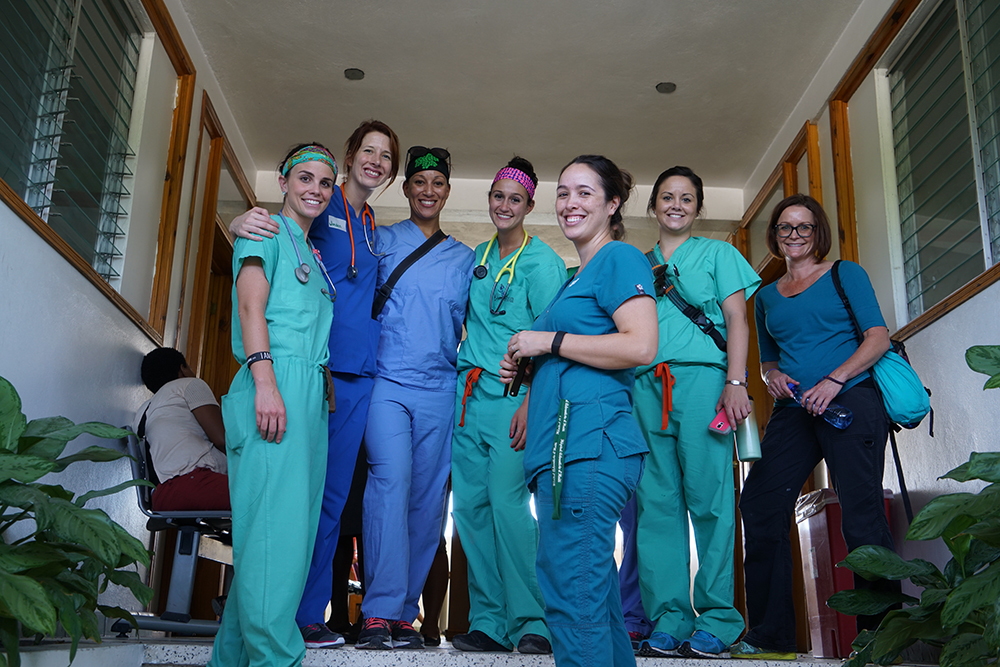
First day excitement for these MTSA mission team members is evident as they are pictured on the front steps of the hospital.
Answering a specific need of the hospital’s nursing staff, the team brought dozens of stethoscopes donated by practitioners in the Nashville area. Most of the nurses at the hospital did not have their own stethoscope nor any experience using one. Therefore another aspect of the team’s work was showing the nurses how to put the stethoscopes to good use with patients.
The mission team consisted of:
- Chris Hulin, DNP, MBA, CRNA, MTSA President
- Rachel Brown, DNP, CRNA, MTSA Program Administrator
- Rob Taylor, MD, MTSA Medical Director, and physician consultant, Sumner Regional Medical Center
- Stace Dollar (’03), CRNA, Central Kentucky Anesthesia
- Dana Stoneking, Ultrasound Application Specialist, Tenvision, LLC
These MTSA students were a vital part of the team:
- Katie Allen, SRNA from Nashville
- Lindsay Camp, SRNA from Plano, Texas
- Amelia Hughes, SRNA from Lawrenceburg, Tenn.
- Bliss Runnels, SRNA from Nashville
- Hailey Rutledge, SRNA from Memphis
- Jordan Timothy, SRNA from Chattanooga, Tenn.
- Tanesha Young, SRNA from Clarksville, Tenn.
A Student’s Perspective
“This was the first medical mission trip I’ve ever taken abroad,” said Camp, who is scheduled to graduate in November. “The equipment and conditions were much different than in the U.S., which was good experience in how to improvise with what you have.
“In addition, the language barrier was a challenge because translators would only be there during the pre-op. Once we took the patient back to the OR, we had to use non-verbal communication to help them, especially pediatrics. We would do the best we could and hope our expression made them feel as comfortable as possible,” she said.
Camp expressed amazement at how hard some patients had to work to get there for the opportunity to be seen by the team: “We had one case where a 20-year-old had a fungal infection on his hands and feet since he was a year old. He hadn’t been able to walk his entire life. So his mom carried him and helped transport him via bus to the hospital where he had to sleep overnight on a mattress on the floor because he couldn’t been seen right away.”
Along with their work in the OR, MTSA students spent four days teaching assessment skills to a group of hospital nurses, using stethoscopes. According to Camp, each of them facilitated one day of teaching, which included planning the day’s lesson based on the nurses’ knowledge deficits. Then they guided the nurses on what to do with the results of their patient assessments.
The team also included a sonographer, Dana Stoneking, who held three sessions with the medical staff at the hospital using the ultrasound machine donated by MTSA. In addition, Tenvision donated an ultrasound machine to Visitation Hospital in the Nippes region, and Stoneking provided training to their midwives and doctors.
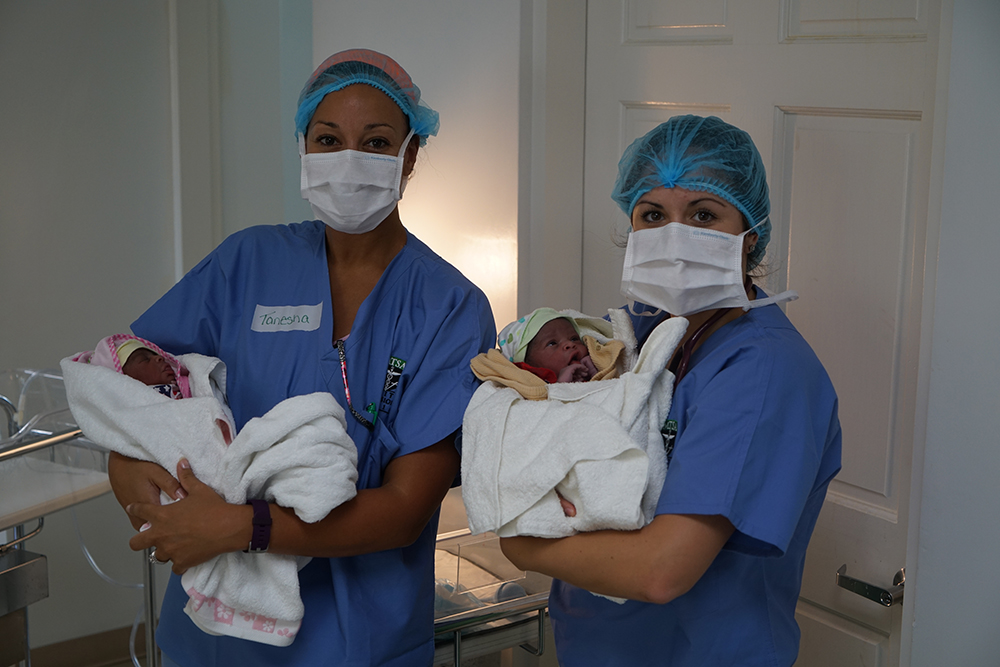
These two MTSA students are grinning ear-to-ear behind masks as they care for two newborns.
A CRNA’s Perspective
This was also Dollar’s first mission trip. He served as one of the instructors that taught students and provided pain management and regional anesthesia for the surgical cases, which involved many reconstructions and radical repairs.
“It was amazing—a truly eye-opening experience for me personally,” Dollar said. “One case, in particular, was a 1-year-old who had a large mass under his right arm. He was unable to lift his arm because of the weight. The surgery we performed to remove the mass will change his life forever.”
Dollar said he is already planning to participate in future mission trips. “I’m really looking forward to next year. I’d recommend it to anyone who has never experienced it before.”
Embodying MTSA’s Mission
Hulin praised members of the Touching Hands group, including Drs. Jeffrey Gelfand and Anthony Smith. He also showed appreciation for Dr. Taylor and Dollar, who were both “vital to our efforts, spending time and providing continuing education for our students.
“I’m so proud to say the MTSA students who participated in this mission trip exceeded everyone’s expectations and were a joy to work with,” Hulin said. “The surgical team said it was the best anesthesia care they’ve ever had on any mission trip and that the students pitched in at every turn—even outside of their anesthesia duties by circulating in the OR and scrubbing-in on cases to make sure we could take care of as many people as possible.
“It was an honor to be a part of the trip and witness a team that helped raise the level of care to a higher, international standard. They truly embodied our mission to reflect Christ in anesthesia education,” Hulin added.
Those interested in supporting this year’s mission trip are urged to make a donation at any time. Additionally, MTSA will host its 4th annual Mission & Awards Gala on Thursday, May 4. Proceeds from the event benefit missions in both Haiti and local communities. For more information, visit www.mtsa.edu/donate.
About Haiti
Haiti is the poorest country in the Western Hemisphere, with 80% of its 10 million inhabitants living under the poverty line. In 2010, a massive earthquake struck near Port-au-Prince. And just two weeks prior to the MTSA mission team’s arrival, Hurricane Matthew caused widespread devastation along the country’s southwestern coast.
Acute Surgical Pain Management Fellowship receives five-year approval from COA
Call for applications to begin this spring
As previously announced, MTSA and the American Association of Nurse Anesthetists (AANA) have partnered to offer a postgraduate Acute Surgical Pain Management Fellowship (ASPMF) beginning this summer. The objective of this new certificate program, a component of the AANA Pain Management Curriculum, is to advance the knowledge and skills of Certified Registered Nurse Anesthetists (CRNAs) in acute surgical pain management and prepare them to help meet the growing need for this evidence-based approach in the United States.
Last October, the ASPMF received a full five-year approval status from the Council on Accreditation of Nurse Anesthesia Educational Programs. And in November, Bill Johnson, DNAP, CRNA, joined MTSA as Director, Acute Surgical Pain Management Fellowship, and Assistant Program Administrator.
Since joining the administration, Johnson has been collaborating with experts in the field to bring the most up-to-date, evidenced-based curriculum using the Design2Learn (D2L) online learning platform.
“We are actively developing clinical sites for Fellowship practice engagement in Ultrasound Guided Regional Anesthesia techniques and Acute Surgical Pain Management services,” he said.
Tentative plans for accepting applications for the Fellowship will begin this spring. Full details regarding requirements for admission, the application process, and interviews for potential applicants will be available at MTSA’s website in the upcoming months.
For more information, visit www.mtsa.edu/fellowship, or contact Bill Johnson at bill.johnson@mtsa.edu or (615) 732-7846.
MTSA’s 4th annual Mission & Awards Gala set for May 4
Proceeds will benefit the School’s mission initiatives
Planning is underway for the 4th annual MTSA Mission & Awards Gala to be held Thursday, May 4, 2017.
Continuing the tradition from last year’s event, proceeds from the 2017 Gala will benefit MTSA’s mission initiatives, including a Haiti trip planned for later this year.
“With the success of our Haiti mission trip last year, we’re excited to be planning another effort that will have an even bigger impact,” said MTSA President Chris Hulin. “The positive feedback we received is a testament to the many people who donated to the initiative and made it a reality. We couldn’t have done it without their generosity and selflessness.”
The Gala also helps build community involvement, support and awareness for MTSA while honoring alumni, individuals, community partners, and others for their involvement with the School.
Five awards will be presented as nominated by MTSA alumni and community friends including: Mary Elizabeth “Ikey” DeVasher Alumni Distinguished Service Award; Nevin Downs, MD Leadership Award; Clinical Excellence Award; Philanthropy Award; and Mission & Heritage Award.
The evening will include a reception, dinner, entertainment and award ceremony. The event is open to all including alumni, faculty, students, physicians, medical groups, corporations and individuals. There are several sponsorships available, in addition to table sponsors and individual tickets.
For more information, contact the MTSA Advancement & Alumni Office at (615) 732-7674 or visit www.mtsa.edu/gala.
National CRNA Week
Safe and effective anesthesia care for every patient
During the week of Jan. 22-28, MTSA will join the celebration of anesthesia patient safety and the nation’s 50,000+ Certified Registered Nurse Anesthetists and student registered nurse anesthetists who safely and cost-effectively provide approximately 43 million anesthetics each year.
The theme for this year’s National CRNA Week is “Safe and effective anesthesia care for every patient.” The event helps patients, hospital administrators, healthcare professionals, policymakers, and others become more familiar with the CRNA credential and the exceptional advanced practice registered nurses who have earned it.
Students, alumni and guests are invited to the MTSA classroom in Building A lecture hall on Wednesday, Jan. 25, at 12:30 p.m. for cake with ice cream and door prizes. Be sure to watch for a variety of messages on social media from MTSA in commemoration of this special week.
Advanced Physiologic Foundations course offered online
MTSA announced its first online community course offering of the Advanced Physiologic Foundations course typically held one time per year in person. The decision comes in response to requests from applicants and the community, both near and far.
The course will begin in February and continue for 12 consecutive weeks.
MTSA Professor Brett Clay, DNAP, CRNA, has worked with an educational consultant in converting the in-person course to an online format. “The content delivered is the same; however, the delivery method is different,” explained Maria Overstreet, PhD, RN, MTSA Dean.
“This has been a challenge to the pedagogy for our Master’s level instructors who typically have offered courses only in an in-person format. The online format has many demands for the instructor that are quite different than the demands of an in-person course,” she said.
“We applaud Dr. Clay for taking a leap of faith and working to create a robust course for those who cannot attend in-person but who desire the same level of difficulty,” Overstreet added.
For more information, contact Pam Nimmo at the MTSA admissions office at (615) 732-7662.
TANA student rep
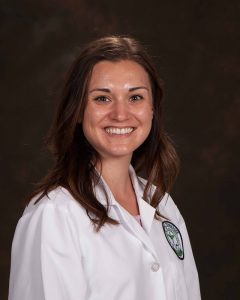
MTSA Junior Alissa Guerts was elected by her fellow peer students across TN as the TANA student rep for 2016-2017. Congratulations, Alissa!
A Founder’s Smile
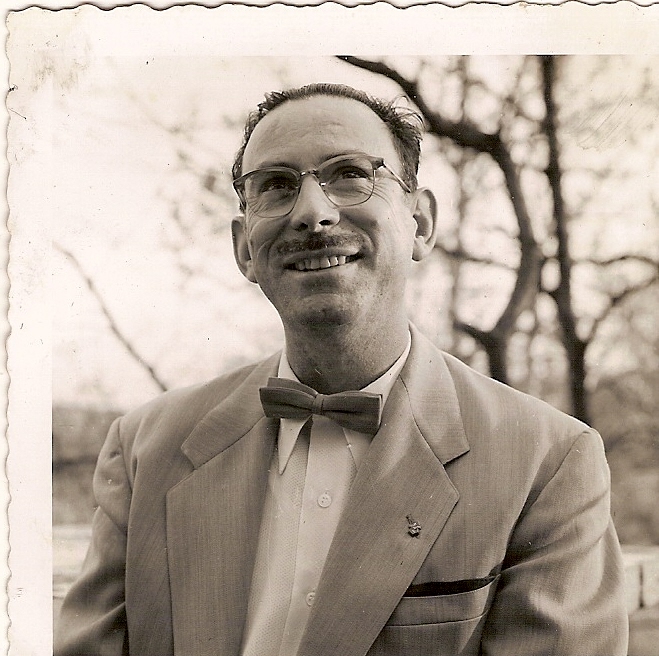
MTSA founder Bernard V. Bowen, CRNA, is pictured in a setting on the old Madison Hospital campus in 1950 – the year the School began. 2017 marks the 6th year since his death. He would be 100 years old this year.


